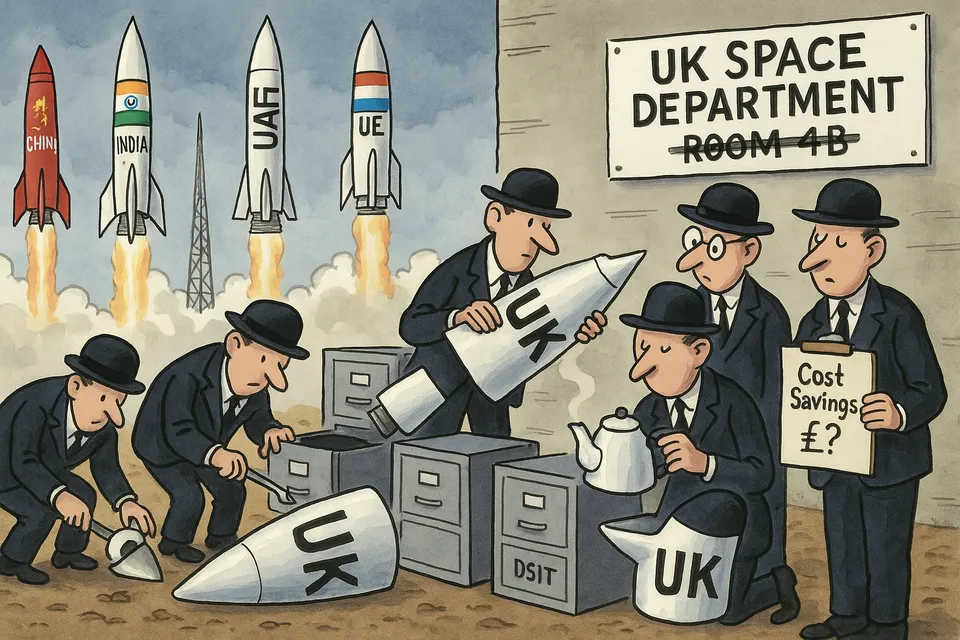Britain Scraps Its Space Agency While the Rest of the World Builds Theirs

The UK Just Reversed 15 Years of Space Progress to Save Pennies
The UK Space Agency was established in 2010 to foster growth in the space sector, but its recent dissolution marks a significant regression in the country's space ambitions.
While China launches moon missions and India lands on the lunar south pole, Britain has decided the future of space exploration is best handled by civil servants in Whitehall. The UK Space Agency will be dissolved and absorbed into the Department for Science, Innovation and Technology by April 2026, reversing the very reforms that made Britain competitive in the global space race.
This is what institutional decline looks like in practice: scrapping successful agencies to create the illusion of efficiency while guaranteeing future failure.
The Facts They Don’t Want You to Focus On
The UK Space Agency was created in 2010 specifically because government departments were too bureaucratic and slow-moving to compete in the rapidly evolving space sector. In its 15 years of independent operation, UKSA has:
- Overseen growth of the UK space sector to £18.6 billion annually
- Supported employment for 55,000 people across Britain
- Facilitated Tim Peake becoming the first British ESA astronaut on the International Space Station
- Developed Britain’s first domestic satellite launch capability in Scotland
- Positioned the UK as a leader in small satellite technology
The government claims this merger will “save money” and “cut duplication.” They haven’t specified how much money. They haven’t identified what duplication exists. What they have done is announce the elimination of the very independence that made UKSA successful.
The Global Context Ministers Hope You’ll Ignore
Here’s what’s happening while Britain retreats from space ambitions:
Luxembourg, with a population smaller than Birmingham, created its own space agency in 2018 and now hosts over 50 space companies. The UAE established its space agency in 2014 and has already sent a probe to Mars. Australia created its space agency in 2018 and is rapidly expanding launch capabilities.
Dr Simeon Barber of the Open University states the obvious: “Around the world countries have been recognising the importance of space by setting up national space agencies, and for the government to be scrapping ours seems like a backward step.”
Backward is generous. This is Britain actively choosing decline.
What “Bringing It In House” Actually Means
Space Minister Sir Chris Bryant claims that absorbing UKSA into his department will bring “much greater integration and focus.” This is the same rhetoric used whenever governments eliminate successful independent bodies:
What they claim: Greater integration and ministerial oversight What actually happens: Decision-making slows to departmental pace, innovation gets strangled by civil service procedures, talent leaves for the private sector or overseas, international partners lose a clear point of contact
The space sector moves at Silicon Valley speed. Government departments move at Whitehall speed. This mismatch is precisely why UKSA was created as an independent agency in the first place.
The Pattern of British Institutional Sabotage
This follows a depressingly familiar template in modern Britain:
- Identify a successful institution (UKSA growing the sector from £6.5bn to £18.6bn)
- Claim it needs “reform” for efficiency (no evidence of inefficiency provided)
- Eliminate its independence (absorb into departmental bureaucracy)
- Watch it decline (coming 2026-2030)
- Wonder why Britain keeps falling behind (coming 2030s)
We’ve seen this with research councils merged into UKRI, regional development agencies abolished, and countless other bodies that worked independently but didn’t fit the Whitehall model. Each time, the same promises of “efficiency” and “integration.” Each time, the same result: institutional decay.
The Real Cost Calculation
The government refuses to specify how much money this will “save.” Let’s do the arithmetic they won’t:
UKSA’s annual budget is approximately £600 million - tiny compared to the £18.6 billion sector it oversees. That’s a 31:1 return ratio. If this reorganization damages sector growth by even 2%, it will cost Britain £372 million annually - far more than any conceivable “savings” from eliminating UKSA’s independence.
But this isn’t about rational cost-benefit analysis. It’s about the appearance of action, the illusion of efficiency, and the consolidation of ministerial control.
Why This Perfectly Captures Britain’s Decline
Successful countries are creating space agencies because they recognize space as the next economic frontier. Britain is eliminating its space agency to save unspecified amounts on “bureaucracy.”
Successful countries empower independent agencies to move at market speed. Britain is pulling everything back into departmental control where nothing moves without ministerial approval.
Successful countries invest in sectors showing 10% annual growth. Britain is dismantling the very structures that enabled that growth.
The Inevitable Outcome
By 2030, when Britain’s space sector has stagnated while competitors surge ahead, there will be a government inquiry into “why Britain lost its competitive advantage in space.” The inquiry will recommend creating an independent space agency with the authority and agility to compete globally.
No one will mention that we had one. And destroyed it. To cut costs.
This isn’t governance. This is managed decline disguised as efficiency. The UK Space Agency’s absorption into DSIT isn’t a reform - it’s a surrender. Another British institution that worked, killed by a political class that confuses movement with progress and cost-cutting with competence.
Space was one of the few sectors where Britain still competed globally. Was.
Commentary based on UK independent space agency scrapped to cut costs by Pallab Ghosh on BBC News.